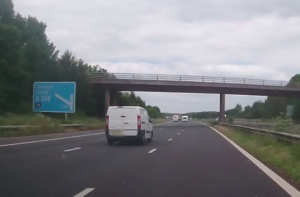A new industry-wide group has been set up to tackle the issue of roadworker abuse across the network.
Formed in response to the growing issue of tackling the widespread abuse of workers, which happens at ‘alarming’ regularity, the group is focussed on three main objectives:
*A change in the law to reflect the recent announcement around the doubling of sentences for those who abuse key services workers to extend to highways and construction.
*A public awareness campaign around how our employees are not merely
maintenance operatives who keep our network flowing but also have a vital role to play within our community.
*An organisational campaign to reduce the stigma around the reporting of the negative impacts on mental health which abuse causes to our workforce.
Led by Kari Sprostanova, Health Safety Environment and Sustainability Director, ULCS at Balfour Beatty and involving Safer Highways Chief Executive, Kevin Robinson and several Safer Highways’ board members including David Foster, SHEQ Director of Carnell, and Rachel Heaps of Tarmac, the group has the aspirational goal of ‘effecting real change in the climate around the issue of abuse’ whilst also linking with the
Highways England Supply Chain Safety Leadership Group to find a way to ‘once and for all’ manage incursions on both the high and low speed networks.
Speaking about the announcement, Safer Highways CEO, Kevin Robinson explained why this was an space he felt so passionately to step into.
He said, “All too often we hear stories of our people being abused whilst simply trying to go about their daily work. But verbal abuse is just the tip of the iceberg. In the last 10 years one contractor alone has reported 25 incidents of a gun being pulled on an operative, and worse still, one being narrowly missed by an arrow fired from a crossbow. How is this acceptable? We need to take a stand, not tomorrow, today.”
Recent announcements from the Highways England Supply Chain Safety Leadership Group as a part of its newly released common intent document around Impact Protection Vehicle strikes have revealed between 2015 and 2020, the first Road Investment Strategy period, there were 8,676 incursions recorded. Nearly 50%, 3,581 of these, were reported as road
users driving into roadworks trying to seek a ‘personal benefit’, such as avoiding a diversion route. But this data encompasses the Highways England Strategic Road network and does not offer an indicator of the scale of the challenge on our local roads, or even offer any classifications for abuse, according to Safer Highways.
Speaking about this and why there should now be a real drive to change the landscape Mr Robinson said: “Over the last few months, our workforce have been classified ‘key workers’ and as such they should be afforded the same level of protection as others such as doctors and nurses.
“We as an industry perform a vital role in keeping our country moving and as such we should be afforded the same level of protection.Yet figures show we are not, incursions are commonplace and the level of abuse our workforce suffer is beyond frightening.
“When we first examined the issue, we concluded this was a massive challenge and something we, as a group could not tackle alone.
“Since we started upon this journey 12 months ago with a scope of works it has become alarmingly apparent this is something which much be tackled in the here and now. There have been numerous attempts over the past decade to scale this Everest, and yet whilst all have chipped away at the problem none have truly found a solution, hence on this occasion we have taken the unprecedented step of involving the regulator (Health and Safety
Executive) at the outset.
“I sincerely hope that, through a collective desire, we can truly make a difference and effectively uphold the Safer Highways values of being able to look back in the years to come and say we made a difference for the man with the boots on the ground and the shovel in his hand.”
























